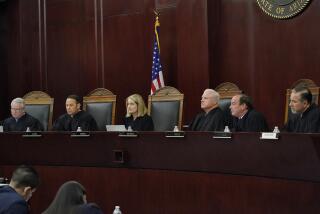Elections Today Air Themes Likely to Shape ’92 Contests : Politics: Wofford cites economic woes in his Senate race against Thornburgh. Washington state’s term-limit plan tests discontent with Congress.
- Share via
WASHINGTON — A special U.S. Senate election in Pennsylvania and a term-limit referendum in Washington state today will test voter frustration with President Bush’s economic policies and resentment of the Democratic-dominated Congress--forces expected to help shape the 1992 presidential campaign.
The contest in Pennsylvania pits Democrat Harris Wofford against Republican Dick Thornburgh. Wofford is fighting to hold on to the seat to which he was appointed last May after the death of Republican Sen. John Heinz. Initially, the race was expected to be a cakewalk for Thornburgh, who resigned his post as U.S. attorney general to seek the seat.
As a former two-term governor, the 59-year-old Thornburgh is one of the Keystone State’s better known politicians. Wofford, 65, had never held an elective office or even run for one before Democratic Gov. Robert P. Casey appointed him to the Senate. His background as an official in the John F. Kennedy Administration, president of Bryn Mawr College and Pennsylvania labor secretary suggested an allegiance to liberal doctrines now deemed hopelessly out of date.
But Wofford campaigned as if he, not Thornburgh, were the challenger. Wofford’s populist rhetoric and policy proposals--he denounced the excesses of the Democratic-controlled Congress and called for national health insurance--resonated with middle-class Pennsylvanians feeling squeezed by the prolonged recession. By last week, he had cut the nearly 45-percentage-point lead once held by Thornburgh to zero.
From the beginning, Wofford sought to give the race national significance, pointing out that Thornburgh had served as chairman of Bush’s Domestic Policy Council. “We have used that fact to put Bush’s domestic policy agenda on trial in this campaign,” said Wofford campaign manager Paul Begala.
Using themes that Democrats are planning to employ in next year’s drive to regain the White House, Wofford repeatedly attacked Bush for failing to do enough to combat the recession and for lavishing too much attention abroad and not enough on domestic concerns.
Thornburgh sought to cast the choice facing voters in different terms. “The contrast is between one (Thornburgh) who has had experience in eight years as governor cutting taxes and bringing jobs to Pennsylvania, as against a tax-and-spend 1960s liberal who participated in an Administration that just raised taxes nearly 50%,” Thornburgh said in an interview.
As for Wofford’s attempt to make the election a referendum on Bush, Thornburgh said: “George Bush is very popular in Pennsylvania. I would be glad for anybody who wants to associate me with George Bush and my opponent with (Gov.) Bob Casey.”
Nevertheless, Thornburgh’s own tactics made clear that in the campaign’s climactic hours, it was Wofford who was setting the agenda. On the eve of the election, the Republican found himself forced to talk about health care, Wofford’s chief issue, charging that his opponent was “either lying or dangerously naive” when he claimed that government could provide universal coverage at lower costs without raising taxes. In response, Wofford campaign manager Begala accused Thornburgh of “pathetic scare tactics.”
In Washington state, the vote on term limits appeared to offer an outlet for voter disgruntlement with Congress. That attitude had intensified in response to the Senate’s decision to give itself a pay raise without warning, disclosure of bad-check writing by House members and the Senate Judiciary Committee’s clumsy handling of sexual harassment charges lodged against Supreme Court nominee Clarence Thomas.
The term-limit measure, Initiative 553, is the strictest ever put before voters in the United States. Not only would it limit members of the House of Representatives to three two-year terms and U.S. senators to two six-year terms, it would count past service toward the limit. Incumbent members of Congress would be allowed another term, however, if they already have reached the limit. Among the targeted victims of the measure is House Speaker Thomas S. Foley, who has represented Spokane for 14 terms.
Until recently, the initiative was considered certain to be passed, probably by a landslide. But then Foley and virtually the entire state political and business Establishment began to fight back, urging the public to consider the advantages of the Washington delegation’s seniority in Congress. If Washington had to field a team of rookies in the 1990s, states such as California with much larger congressional delegations would be in prime position to exploit Washington’s natural resources, Foley and other term-limit opponents argued. By election eve, both sides said that the apparent margin had closed sharply.
Washington state was also expected to draw a record off-year turnout today because of the presence on the ballot of two emotion-laden propositions. One would legalize physician-assisted suicides for terminally ill patients. The other would write into the statutes a woman’s right to an abortion.
In the day’s only gubernatorial contests, Democrats appeared to have the advantage. Polls in Mississippi showed that Democratic incumbent Ray Mabus was ahead of Republican millionaire businessman Kirk Fordice. In Kentucky, Democratic Lt. Gov. Brereton Jones was leading Republican Rep. Larry J. Hopkins in a contest to succeed Democratic Gov. Wallace Wilkinson, who is barred from seeking reelection.
Staff writer John Balzar in Seattle contributed to this story.
More to Read
Get the L.A. Times Politics newsletter
Deeply reported insights into legislation, politics and policy from Sacramento, Washington and beyond. In your inbox twice per week.
You may occasionally receive promotional content from the Los Angeles Times.










